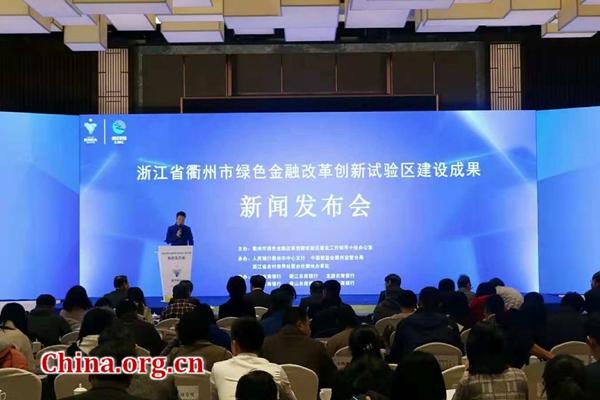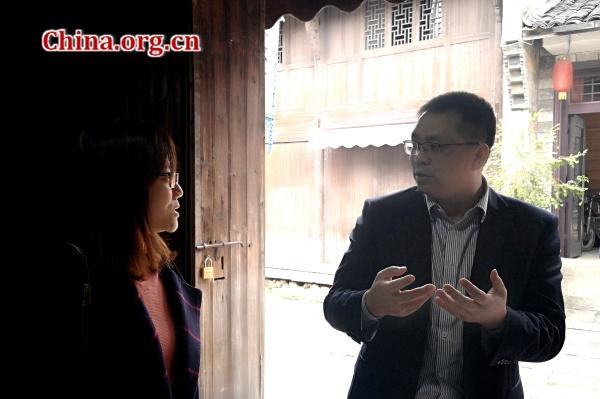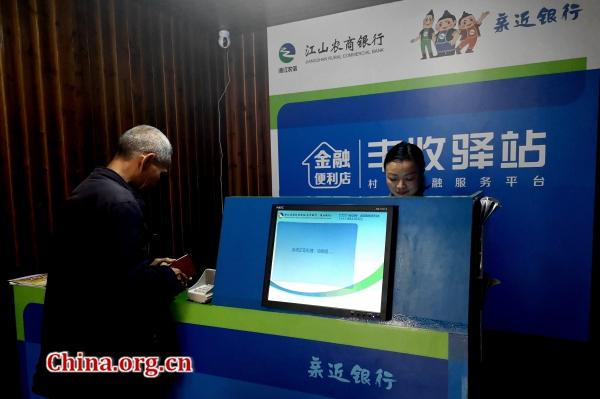Authorities in Quzhou, Zhejiang province, have announced that they have yielded fruitful outcomes following the reform and innovation of green finance over the past 18 months.

Authorities present the results of reform and innovation of green finance in Quzhou, Zhejiang province on Dec. 1, 2018. [Photo by Wang Xiaojun/China.org.cn]
On Dec. 1, authorities in the historical city of Quzhou, Zhejiang province, unveiled the fruitful results of the reform and innovation of green finance over the past 18 months.
In June 2017, the city was approved by China's State Council as a pilot zone for green finance reform and innovation. Since then, efforts have been underway to redirect the financial sector to support companies, projects and individuals contributing to green development, resulting in many significant achievements.
Since the introduction of the pilot scheme, rural credit institutions have promoted green finance and launched a series of original green products; moreover, the government has established standardized systems of green finance and introduced approval procedures.
Promoting green finance and inclusive finance together
Authorities in Quzhou have long been promoting financial products and services which are accessible to low-income individuals, known as inclusive finance. Rural credit institutions are the largest financial institutions in Quzhou, providing the broadest service coverage and enjoying the highest market share. They provide basic financial services to more than 2 million people in the city, covering four-fifths of the farmers and two-fifths of small and micro businesses.

Xu Qingguo, chairman of Jiangshan Rural Commercial Bank in Quzhou introduces service outlets of his bank on Dec. 2, 2018. [Photo by Zhang Jiaqi/China.org.cn]
After Quzhou was approved as a pilot zone, the representatives of the rural credit institutions carried out a series of discussions on green finance reform. They were initially wary, recalled Xu Qingguo, chairman of Jiangshan Rural Commercial Bank.
"But as discussions went on, a consensus emerged that green mountains are gold mountains," Xu said.
Xu's bank operates 327 service outlets across all the villages and communities in Jiangshan city, a city under the administration of Quzhou. Offering a large amount of financial services, as well as assisting with local government affairs like pension distribution, they provide services to over 1 million people every year.
Following the green finance reform and innovation, Xu's bank initiated a platform for personal accounts to quantify the reduction in carbon emissions. Customers with personal accounts can now calculate how much they reduce carbon emissions by making use of facilities near their home instead of taking vehicles to the bank, and by simply viewing statements online rather than on paper.
Customers who successfully lower their carbon emissions will have this transformed into score points, which can be exchanged for gifts or vouchers.
"As a local bank, it is necessary for us to fulfill our social responsibilities," Xu said.
Wu Tongzheng, director of Quzhou Branch Office of Zhejiang Rural Credit Cooperatives Union, said that"promoting green finance reform is an'upgraded version' of deepening the development of inclusive finance. Inclusive and green finance can complement each other in the way of development."
"'Green' makes inclusive finance more sustainable, and'inclusive' makes green finance more convenient. The two must be promoted hand in hand," Wu added.

A local farmer is offered services at an outlet of Jiangshan Rural Commercial Bank in Quzhou, Zhejiang province, on Dec. 2, 2018. [Photo by Zhang Jiaqi/China.org.cn]
Launching a series of original green products
Quzhou is heavily forested, with forests covering over 73 percent of the surrounding area. In order to protect this valuable natural resource, the authorities are encouraging individuals and companies who own forest rights to use these rights as guarantees on new mortgages offered by financial institutions.
This is just one of many green finance products Quzhou developed in accordance with the specific conditions of different regions.
The city has so-far launched 142 innovative green products covering credit, bonds, insurances, payments and many other types. In 2018, the number of new green products in Quzhou increased by 246 percent, according to Zhou Linhai, director of Quzhou Banking Regulatory Bureau.
Besides the mortgage loans with forest rights, the city also took the lead in the country to launch green finance bonds for small and micro businesses. They benefited 3,200 small and micro businesses with an average loan of 470,000 yuan per business.
The city also launched many innovative green insurance products, yet to be introduced nationwide, like liability insurance for production safety and environmental pollution, pig insurance, and comprehensive liability insurance for electric bicycles.
Establishing standard systems of green finance
According to Wang Liangchun, vice mayor of Quzhou, the city has also established three-level index systems to evaluate green projects and green enterprises respectively, and formulated standards for the green banking system in local institutions.
The evaluation of green companies is based on six primary indexes: business performance, industry performance, environmental performance, social performance, corporate governance, and qualifications & honors. In addition, there are also 19 secondary and 41 tertiary indexes set under the primary ones.
The evaluation of green projects also adopts a similar system comprising four primary, 10 secondary and some tertiary indexes.
On this basis, the city also established a green project pool, currently investing in 56 green projects making up a total investment of 24.05 billion yuan (US$ 3.47 billion).
According to Wang, with the evaluation systems in place, the city rated companies and projects according to the scores, and on this basis, guided social capital to increase support for the transformation and upgrading of traditional industries and the development of green industries and smart industries.
Facilitating approval procedures
In addition, the city also reengineered the approval procedures of the rural commercial banks, so that local institutions could play a leading and demonstrative role in facilitating approval.
The city also encouraged all commercial banks to set up green finance departments, and opened independent channels to facilitate the approval of green loans.
"These moves received wide responses and achieved positive results," said Zhou Linhai, director of Quzhou Banking Regulatory Bureau.
At present, 80 percent of financial institutions under its regulation have set up green finance departments, and there are also 19 pilot banks of green finance.
By the end of this October, the balance of green loans in the city reached 47.23 billion yuan, accounting for 21.45 percent of all loans. This is an increase of 61.96 percent since the previous year, and 47.52 percentage points higher than the average growth rate of other loans.
Wang adds that, Quzhou made a three-year plan when approved as a pilot zone, and these are merely the expected outcomes of developing green finance so far.
As the city moves forward, local authorities plan to speed up the construction of green finance systems, innovate to guarantee the supply of green finance products, further simplify procedures in financial institutions, and step up efforts to promote green finance and investments.